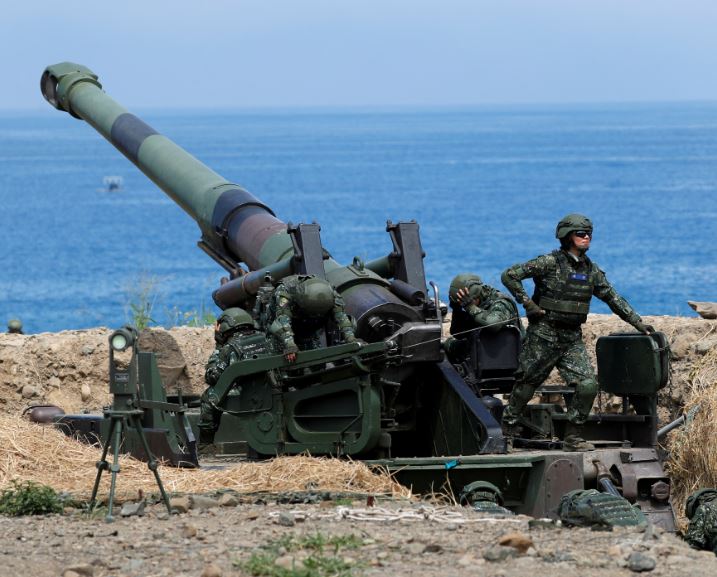Hualien (Taiwan): The US Government Thursday announced trade talks with Taiwan in a sign of support for the island democracy China claims as its own territory, prompting a warning by Beijing that it will take action if necessary to “safeguard its sovereignty.”
The announcement comes after Beijing fired missiles into the sea to intimidate Taiwan after U.S. House Speaker Nancy Pelosi this month became the highest-ranking American official to visit the island in 25 years.
Chinese President Xi Jinping’s government criticized the planned talks as a violation of its stance that Taiwan has no right to foreign relations. It warned Washington not to encourage the island to try to make its de facto independence permanent, a step Beijing says would lead to war.
“China firmly opposes this,” said Ministry of Commerce spokeswoman Shu Jueting. She called on Washington to “fully respect China’s core interests.”
Also Thursday, Taiwan’s military held a drill with missiles and cannon simulating a response to a Chinese missile attack.
Taiwan and China split in 1949 after a civil war and have no official relations but are bound by billions of dollars of trade and investment.
The island never has been part of the People’s Republic of China, but the ruling Communist Party says it is obliged to unite with the mainland, by force if necessary.
President Joe Biden’s coordinator for the Indo-Pacific region, Kurt Campbell, said last week trade talks would “deepen our ties with Taiwan” but stressed policy wasn’t changing. The United States has no diplomatic relations with Taiwan, its ninth-largest trading partner, but maintains extensive informal ties.
The U.S. Trade Representative’s announcement made no mention of tension with Beijing but said “formal negotiations” would develop trade and regulatory ties, a step that would entail closer official interaction.
Being allowed to export more to the United States might help Taiwan blunt China’s efforts to use its status as the island’s biggest trading partner as political leverage. The mainland blocked imports of Taiwanese citrus and other food in retaliation for Pelosi’s Aug. 2 visit.
U.S.-Chinese relations are at their lowest level in decades amid disputes over trade, security, technology and Beijing’s treatment of Muslim minorities and Hong Kong.
The USTR said negotiations would be conducted under the auspices of Washington’s unofficial embassy, the American Institute in Taiwan.
“China always opposes any form of official exchanges between any country and the Taiwan region of China,” said Shu, the Chinese spokeswoman.
“China will take all necessary measures to resolutely safeguard its sovereignty,” Shu said.
Washington says it takes no position on the status of China and Taiwan but wants their dispute settled peacefully. The U.S. Government is obligated by federal law to see that the island has the means to defend itself.
“We will continue to take calm and resolute steps to uphold peace and stability in the face of Beijing’s ongoing efforts to undermine it, and to support Taiwan,” Campbell said during a conference call last Friday.
China takes more than twice as much of Taiwan’s exports as the United States, its No. 2 foreign market. Taiwan’s government says its companies have invested almost $200 billion in the mainland.
Beijing says a 2020 census found some 158,000 Taiwanese entrepreneurs, professionals and others live on the mainland.
China’s ban on imports of citrus, fish and hundreds of other Taiwanese food products hurt rural areas seen as supporters of President Tsai Ing-wen, but those goods account for less than 0.5% of Taiwan’s exports to the mainland.
Beijing did nothing that might affect the flow of processor chips from Taiwan that are needed by Chinese factories that assemble the world’s smartphones and consumer electronics. The island is the world’s biggest chip supplier.
A second group of U.S. Lawmakers led by Sen. Ed Markey, a Democrat from Massachusetts, arrived on Taiwan on Sunday and met with Tsai.
Beijing announced a second round of military drills after their arrival.
Taiwan, with 23.6 million people, has launched its own military drills in response.
On Thursday, drills at Hualien Air Base on the east coast simulated a response to a Chinese missile attack.
Military personnel practised with Taiwanese-made Sky Bow 3 anti-aircraft missiles and 35mm anti-aircraft cannon but didn’t fire them.
“We didn’t panic” when China launched military drills, said air force Maj. Chen Teh-huan.
“Our usual training is to be on call 24 hours a day to prepare for missile launches,” Chen said.
“We were ready.”
The U.S.-Taiwanese talks also will cover agriculture, labour, the environment, digital technology, the status of state-owned enterprises and “non-market policies,” the USTR said.
Washington and Beijing are locked in a 3-year-old tariff war over many of the same issues.
They include China’s support for government companies that dominate many of its industries and complaints Beijing steals foreign technology and limits access to an array of fields in violation of its market-opening commitments.
Then-President Donald Trump raised tariffs on Chinese goods in 2019 in response to complaints its technology development tactics violate its free-trade commitments and threaten U.S. Industrial leadership.
Biden has left most of those tariff hikes in place.
AP
